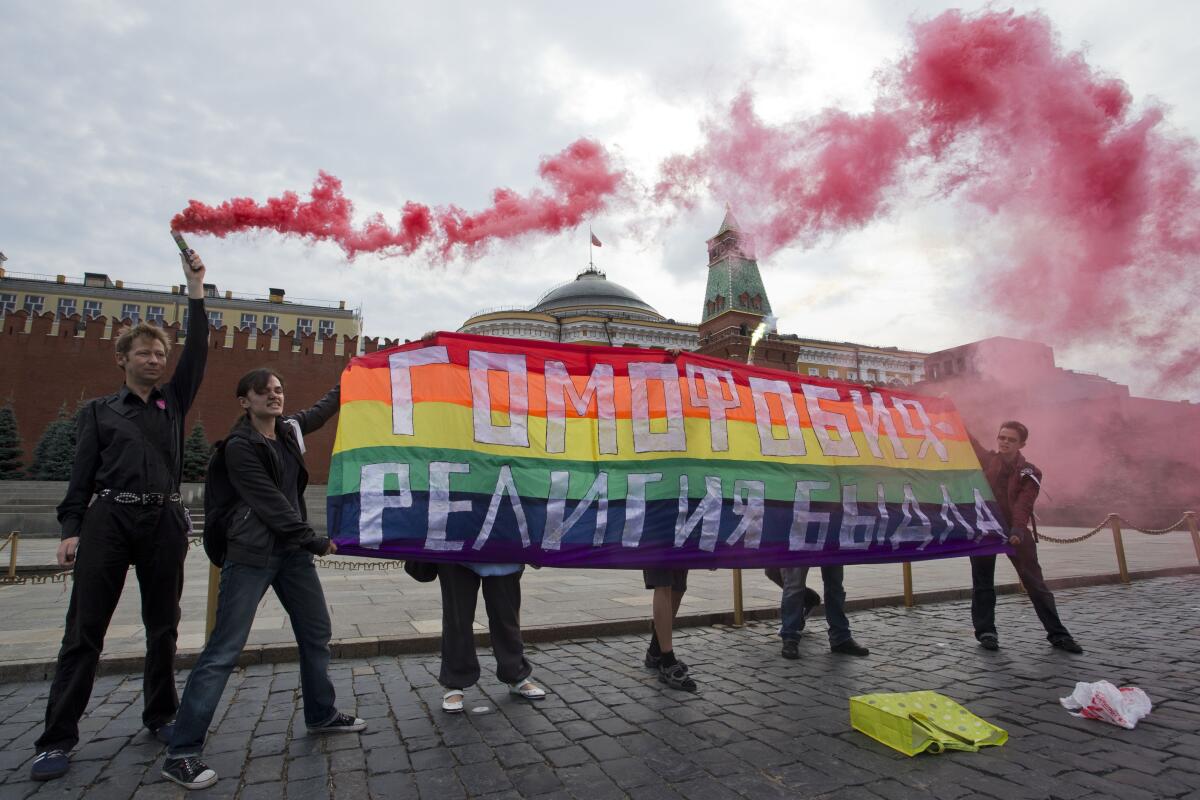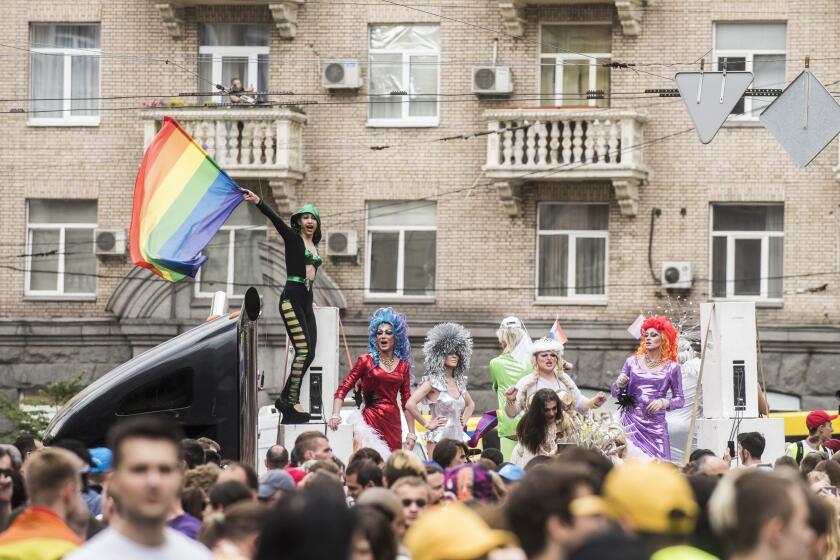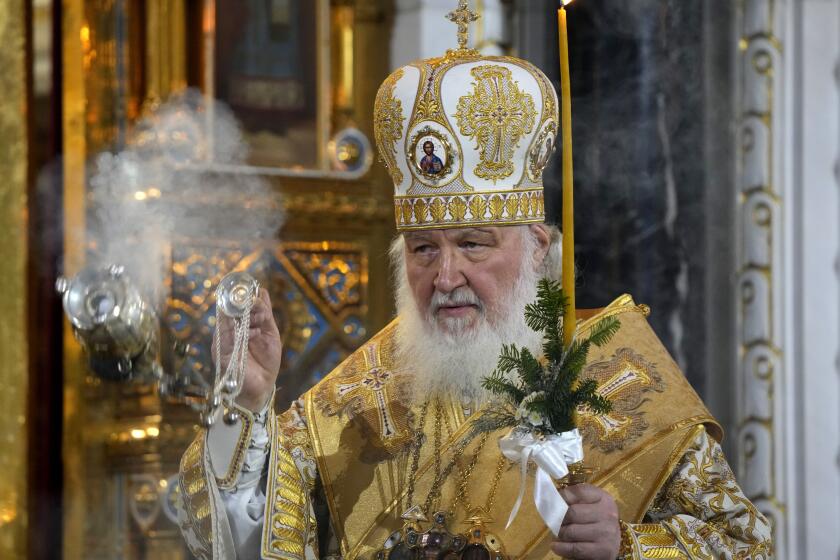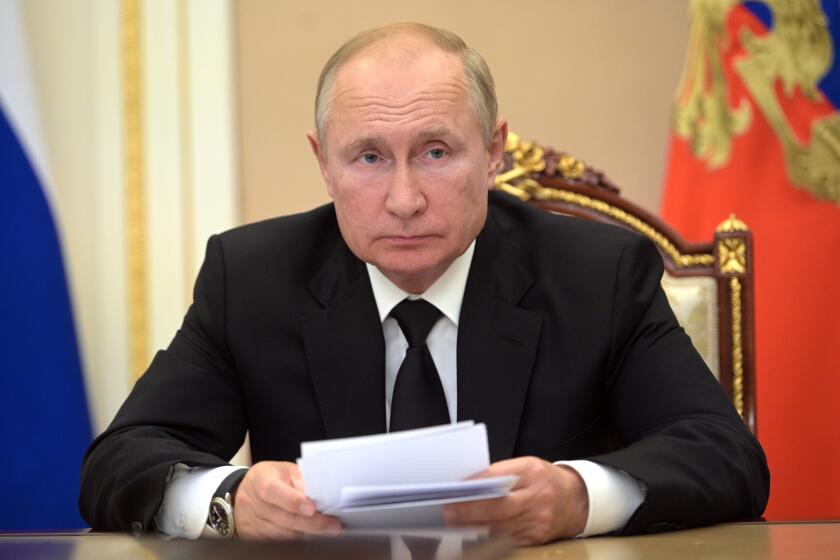In further blow to Russian LGBTQ+ community, lawmakers move to ban gender transitioning procedures

- Share via
TALLINN, Estonia — Russian lawmakers gave initial approval Wednesday to a bill that would outlaw gender transitioning procedures in yet another blow to the country’s beleaguered LGBTQ+ community.
Senior lawmaker Pyotr Tolstoy, who is among the bill’s sponsors, has said it is intended to “protect Russia with its cultural and family values and traditions and to stop the infiltration of the Western anti-family ideology.”
Russia’s LGBTQ+ community has been under growing pressure for a decade as President Vladimir Putin and the Russian Orthodox Church embarked on a campaign to preserve what they deem the country’s “traditional values.”
The bill bans any “medical interventions aimed at changing the sex of a person,” as well as changing one’s gender in official documents and public records.
Russian transgender people and LGBTQ+ rights advocates contacted by the Associated Press described the measure as a grim development.
“We knew that they didn’t like us here, but to go absolutely against human rights, against the existing laws even,” said Maxim, a 29-year-old transgender activist who spoke on condition of anonymity because of safety concerns.
The only option for those seeking to transition through medical care or changing their gender in documents would be to leave the country, according to human rights lawyer Max Olenichev, who works with the Russian LGBTQ+ community. “Neither medical, nor legal transitioning will be possible without changing the country of residence.”
Life for LGBTQ people in Ukraine had been improving, while Russian President Vladimir Putin has systematically attacked gay and transgender people.
The bill must receive three readings by Russia’s lower house of parliament, the State Duma, but there is little doubt it will pass because about 400 members of the 450-seat house signed it, including the house speaker and the leaders of all political factions.
The independent Russian news outlet Meduza reported that such a massive show of unity has happened only three times before under Putin, most recently when 385 Duma members signed on to a bill last year to ban “propaganda of nontraditional sexual relations” among adults.
That initiative was quickly rubber-stamped, and by December 2022, any positive or even neutral representation of LGBTQ+ people in movies, literature, or media was outlawed. The bill severely restricting trans rights came just a few months after that.
Putin’s anti-gay laws set the stage for an international battle
The crackdown on the LGBTQ+ community started well before last year, however. Maria Sjödin, executive director of the Outright international LGBTQ+ rights group, told AP in an interview that the situation in Russia has been deteriorating “over quite a long period of time, coming up on at least 10 years.”
In 2013, the Kremlin adopted the first legislation restricting LGBTQ+ rights, known as the “gay propaganda” law that banned any public endorsement of “nontraditional sexual relations” among minors. In 2020, Putin pushed through a constitutional reform that outlawed same-sex marriage.
But the Kremlin has ramped up its rhetoric about protecting what it calls “traditional values” from the West’s “degrading” influence after sending its troops into Ukraine last year, in what rights advocates saw as an attempt to legitimize the war.
Patriarch Kirill, a close ally of Vladimir Putin, has lent a spiritual justification for the war in Ukraine.
“Do we really want to have here, in our country, in Russia, ‘Parent No. 1, No. 2, No. 3’ instead of ‘mom’ and ‘dad?’” Putin said in September at a ceremony during which four Ukrainian regions were formally annexed by Moscow. “Do we really want perversions that lead to degradation and extinction to be imposed in our schools from the primary grades?”
Vyacheslav Volodin, the speaker of the State Duma, called gender transitioning “pure satanism” as he opened voting on the measure Wednesday.
“We do not want this to happen in our country. Let the diabolical policy be carried out in the U.S.,” Volodin said.
But the clampdown on trans rights is actually a global trend that’s happening in the U.S., too, Sjödin said, adding: “We know there have been over 500 state-level bills introduced in the U.S. attacking LGBTQ rights in different ways with specific focus on trans rights.”
The move targeting transgender people in Russia was not unexpected. Yana Kirey-Sitnikova, a transgender studies researcher, told AP that when anti-Western sentiments emerged last year, she realized that “the authorities would now take us on.” That’s when she changed her gender marker in her documents, even though she wanted to postpone the process for some time.
Kirey-Sitnikova said the procedure under existing Russian law is simple. A person has to obtain a medical certificate stating that they have been diagnosed with “transsexualism.” Such certificates are issued by a panel of medical specialists, Kirey-Sitnikova said, and unlike in some other countries, hormonal therapy or gender-affirming surgery is not required to get this diagnosis.
With this medical certificate in hand, the next step is to go to a state registry office and get a new birth certificate, allowing for the issuance of a new passport and other documents. The whole process could take from several weeks to over two years, depending on the panel’s availability and procedures they do to issue a diagnosis.
Maxim, the activist with the Center T trans rights group who changed his gender marker three years ago, echoed Kirey-Sitnikova’s sentiment that Russia currently “is unique in a good way when it comes to gender transitioning.” He also praised the quality and availability of gender-affirming medical care in Russia, saying there are many good surgeons and endocrinologists advising on hormone therapy.
The Russian LGBT Network and a group of lawyers have been designated as ‘foreign agents,’ which carries strongly pejorative connotations in Russia.
The new bill will take all of that away, according to Olenichev, the lawyer.
Doctors won’t be allowed to diagnose those seeking to transition, and hormonal therapy and surgery will be outlawed for those who haven’t yet managed to change their gender in the documents. Those who have should be able to access necessary medical care, Olenichev said, because the bill outlaws “changing the sex of a person,” but not medical care in accordance with the person’s official gender.
There’s no official data on how many people in Russia have changed gender in official documents, Olenichev said, but the number apparently has grown in recent years.
Independent news outlet Mediazona reported in February that the number of passports issued due to “gender change” has more than doubled in 2022 compared with two years earlier — from 428 in 2020 to 936 last year, according to Russia’s Interior Ministry.
In justifying the new bill, lawmakers cited concerns that men are using the relatively simple procedure of changing gender in official documents to dodge the military draft.
Maxim said that isn’t true. The process “is lengthy, costly, and for transphobic people it is humiliating,” he said, adding that the spike in numbers could be linked to fears about the bill and people rushing to complete the procedures before it takes effect.
Among those hoping to have enough time to transition are transgender teenagers who are under 18 and can’t act on their aspirations even under existing legislation.
Lyubov, a therapist who works with such teenagers, told AP that “the vast majority of them lived on hope and anticipation of their 18th birthday,” and now they have a lot of anxiety. “I view the future as rather sad,” said Lyubov, the mother of a trans 17-year-old who asked that her last name not be used for safety reasons.
“Our children are between a rock and a hard place: On one hand, there’s social pressure, and on the other, lack of hope that when they turn 18, something will change,” she said.
“It is an impossible situation,” Lyubov said, because trans people will be hit with the ban on “changing your life in accordance with your gender identity,” while also having to deal with a society that paints them as “not healthy, not normal, not having the right to live.”
More to Read
Sign up for Essential California
The most important California stories and recommendations in your inbox every morning.
You may occasionally receive promotional content from the Los Angeles Times.













